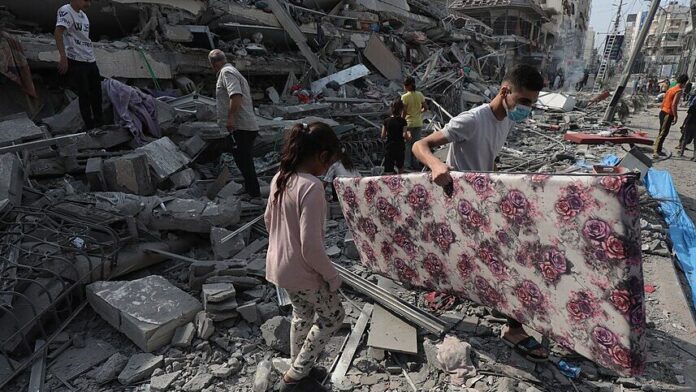The ongoing blockade of Gaza’s border crossings is leading to severe food shortages, risking mass starvation
Gaza is facing a humanitarian catastrophe as the closure of all border crossings, enforced since March 2, has cut off vital humanitarian aid, pushing the region to the brink of famine. The blockade, coupled with the end of a ceasefire on March 18, has caused widespread hunger and suffering among the millions of civilians trapped in the Gaza Strip.
Aid organisations have warned that without urgent intervention, Gaza could experience a devastating famine, while malnutrition and the collapse of essential services are already evident. The food crisis is the most visible consequence of the blockade, with bakeries across Gaza forced to close due to a shortage of flour, fuel, and other basic supplies. “There is no bread, no flour, no food,” said Ahmed Abu Mustafa, a resident of Khan Younis, where families wait for hours at closed bakeries, hoping for any scraps of food.
Moath Fayez Abu Ramadan, a father from Khan Younis, expressed his desperation: “I’ve been here since six in the morning, waiting for the bakery to open so I can feed my children.” His wife was killed in the conflict, and he now faces the unimaginable challenge of keeping his children alive.
The World Food Programme (WFP) confirmed on March 31 that its supplies to Gaza had been fully depleted, and the continued blockade has made resupply impossible. “We are in a famine in every sense of the word,” said Umm Mohammed, a displaced woman from Rafah. “What is the fault of the children?” she asked, her voice tinged with grief.
The Israeli government has maintained that it will continue to block humanitarian aid into Gaza, describing the blockade as a key pressure tactic against Hamas. However, many international aid organisations are sounding the alarm, stressing that the real victims are the civilians, especially children, caught in the crossfire. UNICEF spokesperson Rosalia Bollen noted that since the conflict resumed in March, hundreds of children have been killed or maimed, with many suffering severe injuries like burns and amputations. Bollen stressed that the most urgent action is the restoration of a ceasefire and the reopening of the border crossings to allow aid to flow into Gaza.
Embed from Getty ImagesThe International Committee of the Red Cross (ICRC) has echoed these concerns, warning that without humanitarian assistance, the situation will only worsen. “With no fuel entering Gaza, hospitals are unable to function properly, and water purification systems are on the verge of collapse,” said ICRC spokesperson Hisham Muhanna. The lack of sanitation and clean water has increased the risk of disease outbreaks, further endangering Gaza’s already vulnerable population.
Amid this dire situation, local residents are calling for immediate international action. “We want the war on Gaza to stop,” said Abu Ramadan, his voice full of anguish. “We fear hunger more than death now; we have reached the point where we wish for death,” said Umm Mohammed, reflecting the hopelessness that has taken hold of many in Gaza.
Aid organisations are struggling to provide assistance under impossible conditions. “Children in Gaza are in need of literally everything: food, safe water, health care, and emotional support,” said Bollen. With each passing day, the chances of averting a full-scale humanitarian catastrophe grow slimmer.
The international community now faces a critical crossroads. If the border crossings remain closed and aid continues to be blocked, Gaza could plunge into an irreversible humanitarian crisis. Immediate and sustained action is required to prevent a disaster of unprecedented proportions.
